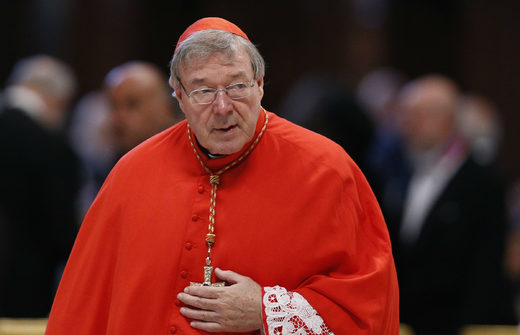
Published January 18, 2023
On Tuesday, January 3, when Cardinal George Pell and I went to pay our respects to Pope Emeritus Benedict XVI, lying in state in St. Peter’s, I couldn’t help but notice the reverence with which the basilica’s little people, the Sanpietrini, greeted the tall Australian who walked slowly with a cane. These ushers and guards are used to ecclesiastical eminence, but there was something different about their evident respect and affection for Cardinal Pell. Here was a man who had suffered greatly for the Church and the truth. Here was a “white martyr.” Attention should be paid. And it was.
We prayed for fifteen minutes at the bier before the high altar on which the Pope Emeritus rested, and later at the tomb of St. John Paul II, before leaving the basilica by a back door, where the cardinal’s car was waiting for us. I only became aware of how difficult walking was for my friend of fifty-five years when he asked to lean on my arm as we descended a slight decline leading to the door. Outside, we saw Archbishop Georg Gänswein, longtime secretary to the deceased Pope Emeritus, who was coming into St. Peter’s with a small group. We exchanged condolences, during which the archbishop told the cardinal that the last book Pope Benedict had read was the first volume of Pell’s Prison Journal (to which I had the honor of contributing a foreword).
The previous evening, Cardinal Pell and I had enjoyed dinner with some fifty Milwaukee province seminarians at the Basilica of St. Paul Outside the Walls, hosted by its archpriest (and Milwaukee native), Cardinal James Harvey. They were an impressive group of men and hung on every word the cardinal, in cracking good form, said in his brief after-dinner remarks. Pell gently but firmly stressed the importance of courage in the priesthood: the courage to evangelize, the courage to face cultural headwinds, the courage to put one’s faith totally in the Lord.
And in the hours immediately after his shocking, unexpected death on January 10, it came to me, through the mental and spiritual fog of a deep grief, that, in those brief comments, George Pell had inadvertently but quite authentically written his own epitaph: He was a courageous man who “en-couraged” others—who gave others courage, or, perhaps better, drew out of others the courage they did not know lay within them.
I know of few, if any, public figures who have displayed the moral courage George Pell displayed for decades as he defended and promoted the truth of Catholic faith in the face of a relentless, vicious Australian media campaign to destroy him. At the request of Pope Francis, he courageously set about cleaning the Augean Stables of Vatican finance and was making serious progress on that Herculean task when the support he had counted on evaporated. Knowing that he was innocent of the absurd charges on which he was first convicted, he courageously turned 404 days in prison into an extended retreat, during which he wrote three volumes of reflections that have given spiritual comfort and encouragement to readers around the world. Returning to Rome after he had been vindicated in his innocence by Australia’s High Court, he played a quiet but effective role behind the scenes, encouraging the defenders of Catholic orthodoxy to think through the requisites for a more vibrant Catholic future.
We were together in Rome almost every day of what turned out to be the last week of his life. And during that time, we discussed at length the nature of the crisis confronting the Catholic Church in 2023: in Germany, to be sure, where the Synodal Path is turning toward apostasy, but also throughout the world Church, as preparations for the October 2023 Synod on Synodality risk stripping the bishops of their authority and turning the Church into a woke discussion club. It was, we agreed, a crisis of apostolicity: Would the teachings of the Lord Jesus, handed on to us by an authoritative apostolic tradition that traces its origins to the original apostolic band, continue to be taught in the twenty-first century? Would the truths of divine revelation, borne by the apostolic tradition, continue to be taught, held, cherished, and lived?
Answering those questions with a robust “yes” requires the kind of courage that Cardinal George Pell displayed for over eight decades, up to the day he died. Others in the Church’s leadership, ordained and lay, must now display that same grit, strengthening each other’s courage in what promise to be difficult, turbulent months ahead.
George Weigel, Distinguished Senior Fellow of the Ethics and Public Policy Center, is a Catholic theologian and one of America’s leading public intellectuals. He holds EPPC’s William E. Simon Chair in Catholic Studies.
George Weigel, Distinguished Senior Fellow of the Ethics and Public Policy Center, is a Catholic theologian and one of America’s leading public intellectuals. He holds EPPC’s William E. Simon Chair in Catholic Studies.











